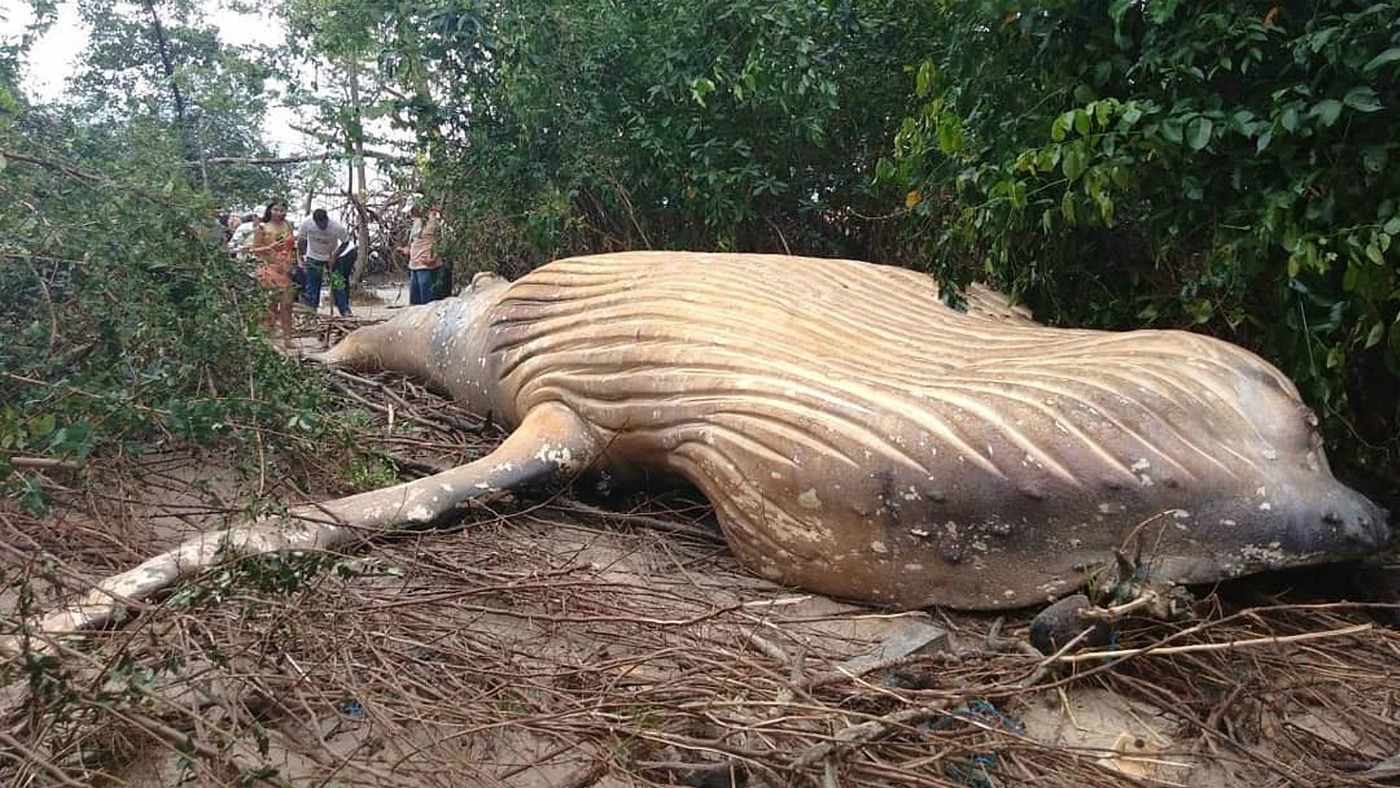How did a humpback whale end up in the Amazon rainforest?
Ten-ton marine mammal was found in wooded area about 50ft from ocean shore

A free daily email with the biggest news stories of the day – and the best features from TheWeek.com
You are now subscribed
Your newsletter sign-up was successful
Animal experts are struggling to explain the discovery of a humpback whale carcass in Brazil’s Amazon rainforest.
The 36ft-long marine mammal was found in jungle undergrowth near a beach on the island of Marajo, which sits at the mouth of the Amazon River, The Independent reports.
Scientists believe the whale, thought to be 12-month-old calf, had been swept ashore by a recent storm, but are puzzled as to how it ended up around 50ft from the ocean shore, Science Alert adds.
The Week
Escape your echo chamber. Get the facts behind the news, plus analysis from multiple perspectives.

Sign up for The Week's Free Newsletters
From our morning news briefing to a weekly Good News Newsletter, get the best of The Week delivered directly to your inbox.
From our morning news briefing to a weekly Good News Newsletter, get the best of The Week delivered directly to your inbox.
Experts are also at a loss as to why the ten-ton creature was so far from its natural summer habitat. During the Amazonian summer, when freshwater rivers flood, local humpback whales “should have already travelled over 6,000km south (4,000 miles), to their feeding grounds in Antarctica’s krill-filled summer oceans”, the science news site says.
Renata Emin, a marine mammal expert with the local Bicho d’Agua conservation group, told Brazilian media: “We believe this is a calf which may have been travelling with its mother and probably got lost or separated during the migratory cycle.
“We’re still not sure how it landed here, but we’re guessing that the creature was floating close to the shore and the tide, which has been pretty considerable over the past few days, picked it up and threw it inland, into the mangrove.”
In November 2007, a minke whale “stranded itself on an Amazon sandbank nearly 1,000 miles inland of the Atlantic Ocean”, before local rescuers freed it, notes Vice’s Motherboard.
A free daily email with the biggest news stories of the day – and the best features from TheWeek.com
Scientists are testing tissue samples from the newly discovered whale in a bid to determine how it died, but “some details regarding its short life and mysterious death may have been lost to several days of decomposition and scavenging” by birds and other wild creatures, reports The Daily Telegraph.
The Maritime Herald shipping journal suggests the calf may have died after swallowing marine plastics, before its body washed up on shore.
-
 Political cartoons for February 12
Political cartoons for February 12Cartoons Thursday's political cartoons include a Pam Bondi performance, Ghislaine Maxwell on tour, and ICE detention facilities
-
 Arcadia: Tom Stoppard’s ‘masterpiece’ makes a ‘triumphant’ return
Arcadia: Tom Stoppard’s ‘masterpiece’ makes a ‘triumphant’ returnThe Week Recommends Carrie Cracknell’s revival at the Old Vic ‘grips like a thriller’
-
 My Father’s Shadow: a ‘magically nimble’ film
My Father’s Shadow: a ‘magically nimble’ filmThe Week Recommends Akinola Davies Jr’s touching and ‘tender’ tale of two brothers in 1990s Nigeria
-
 Epstein files topple law CEO, roil UK government
Epstein files topple law CEO, roil UK governmentSpeed Read Peter Mandelson, Britain’s former ambassador to the US, is caught up in the scandal
-
 Iran and US prepare to meet after skirmishes
Iran and US prepare to meet after skirmishesSpeed Read The incident comes amid heightened tensions in the Middle East
-
 Israel retrieves final hostage’s body from Gaza
Israel retrieves final hostage’s body from GazaSpeed Read The 24-year-old police officer was killed during the initial Hamas attack
-
 China’s Xi targets top general in growing purge
China’s Xi targets top general in growing purgeSpeed Read Zhang Youxia is being investigated over ‘grave violations’ of the law
-
 Panama and Canada are negotiating over a crucial copper mine
Panama and Canada are negotiating over a crucial copper mineIn the Spotlight Panama is set to make a final decision on the mine this summer
-
 Why Greenland’s natural resources are nearly impossible to mine
Why Greenland’s natural resources are nearly impossible to mineThe Explainer The country’s natural landscape makes the task extremely difficult
-
 Iran cuts internet as protests escalate
Iran cuts internet as protests escalateSpeed Reada Government buildings across the country have been set on fire
-
 US nabs ‘shadow’ tanker claimed by Russia
US nabs ‘shadow’ tanker claimed by RussiaSpeed Read The ship was one of two vessels seized by the US military